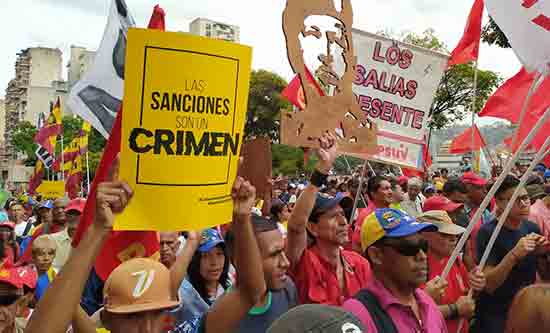
Venezuela’s Bolivarian Revolution is at a crucial juncture. A US-led blockade has devastated the economy. GDP has contracted 70% since 2013. Oil exports are severely restricted. International reserves have plummeted from $20bn in 2013 to $6bn. Secondary sanctions cut off fuel for agriculture and transport. $30bn of Venezuelan assets are frozen worldwide, including $1.8bn of gold withheld by the Bank of England. The currency is effectively demonetised, depreciated from $1 to 8 Bolivars to $1 to 1 million Sovereign Bolivars (a new currency introduced in 2018 wiping five zeros off the Bolivar). Hyperinflation has stripped purchasing power for the working class by an estimated 99%, hammering living standards.
Monthly incomes were raised by 289% in May, yet annual inflation is nearly 4,000%, leaving the legal minimum wage at $2.50 a month. The average monthly family food basket costs $230. Whilst additional bonuses in kind and food boxes are a lifeline, they cannot replace an adequate wage. Venezuelan socialist economist Pasqualina Curcio exposes an ‘ever-increasing inequality between wages and profits’: between 2014 and 2017 (the last year of available data) private sector employers increased their share of GDP from 31% to 50%, whilst 13 million wage earners saw their share drop from 36% to 18%. Curcio argues ‘The issue of wages is central… affirming that there is no money to adjust them when in Venezuela the degree of exploitation has increased 270% in less than four years … [is] paradoxical’. Revolutionaries are clamouring for debate and collective solutions.
In a candid interview,* Elias Jaua, the former Vice President and a leading member of the ruling PSUV Socialist Party outlined his concerns: ‘A socialist revolution must be profoundly democratic or it will not be a revolution at all […] above all, a revolution calls for open, free, and unconditioned debate about ideas. It requires popular participation in decision-making. It must be open to criticism and foster self-criticism. And it must promote co-management and social property – which is economic democracy… The Bolivarian Revolution must be democratic or it will not exist at all.’
Since 1999 the Bolivarian Revolution has sought to channel oil revenues into health care, education, housing, food provision and more. Yet this struggle takes place within a capitalist framework where private companies have majority control of banking, industry, food distribution and media.
Popular participatory democracy has been central to the struggle; from the water and land committees of 1999, to the later explosion of communal councils and communes to identify and address local needs. As state funds dried up, many communes stopped functioning; yet those that became self-sustaining remain in the vanguard of the socialist struggle today, demanding greater political power and demonstrating that communal production can provide solutions to the blockade. The National Communal Parliament Law passed in April and the Communal Cities Law currently under debate have the potential to re-establish participatory democracy as a driving force, but only if the communes are given sufficient political and economic clout.
At the end of 2020, tensions surfaced over the lack of debate around the controversial Anti-Blockade Law whilst the Constituent National Assembly was dissolved without drafting a new constitution; this dashed hopes for a repeat of the nationwide consultation and referendum that characterised the 1999 Constituent Assembly. Denunciations of corruption, mismanagement and attacks on workers’ rights in state and private companies remain unresolved, whilst assassinations of campesino land activists continue with impunity. The cross-class alliance of the PSUV electoral party is straining to contain the interests of the working class and poor alongside the so-called ‘revolutionary bourgeoisie’ who demand more concessions to the private sector.
Jaua highlights the contradictions: ‘Undoubtedly, a country under blockade such as Venezuela…will require national and international investment from private capital. However, this need cannot be satisfied at the expense of the majority of the working people and by sacrificing the country’s economic sovereignty. I believe that putting all our eggs in the private sector basket – an internationalised private sector that is counter-revolutionary and used to benefiting from state subsidies – could be a tragedy of strategic proportions.’
Although 95% of Venezuela’s foreign exchange is generated by public sector oil exports, the private sector has received nearly $700bn of highly subsidized dollars over decades. Yet private domestic investment has dropped by 75% whilst an estimated $350bn is holed up in tax havens. Illustrating this, sugar cane farmers picketed the Cumanacoa sugar mill in April over its failure to pay more than 20% of the sum agreed for the latest harvest. The mill is now run through a public-private ‘strategic alliance’, an opaque management model increasingly eroding previously nationalised companies.
Confronting this wholesale theft and regaining purchasing power for the working class is crucial if the Bolivarian project is to survive. Growing sectors neither identify with the opposition nor the PSUV. December’s parliamentary elections saw the PSUV win a majority on a historically low turn-out (30%). Jaua explains ‘people are forced to survive, to subsist, to scavenge. All of this takes time away from politics… People are losing interest in politics because they feel that the leaders do not care about them… This does not mean that Venezuelans are depoliticised. On the contrary, disaffiliation, including abstention, is in itself a political response’. With regional elections scheduled for November, re-engaging the working class in the political project set out by late socialist president Hugo Chavez is linked to confronting the economic crisis.
Nevertheless, Jaua is optimistic: ‘We place our bets in the people’s political consciousness, in what Chavez sowed, in the will to imagine a different country where we can all live with equality, justice, and dignity…consciousness must express itself through active political participation in all spaces of society if we are to transform the current state of affairs.’
Sam McGill
Cira Pascual Marquina ‘Venezuela’s popular democracy under siege: A conversation with Elias Jaua’, www.venezuelanalysis.com 7 May 2021
FIGHT RACISM! FIGHT IMPERIALISM! 282 June/July 2021




